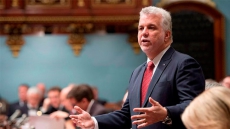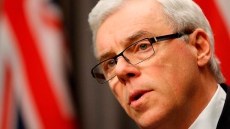CALGARY — The CEO of TransCanada Corp. (TSX:TRP) says he doesn't see the oil industry's appetite for new pipelines faltering even though crude prices have skidded recently to the lowest in more than five-years.
In an interview in his downtown Calgary office, Russ Girling said he's seen ups and downs far more drastic over his career and expects the oilpatch will come out of the latest downturn in reasonably good shape.
"There's a tremendous need to build irrespective of the price of the commodity right now," Girling said.
"We're being pressed to get these facilities on line as quickly as we possibly can."
U.S. benchmark crude has fallen by nearly half over the past six months, settling at US$56.47 a barrel on Wednesday. In recent weeks, there has been a bevy of announcements signalling that next year's activity in the oilpatch will be subdued.
Girling said most in the industry would see an US$80 to US$100 per barrel oil price in the long run, given that demand will continue to grow.
And he points out that when TransCanada first filed its application for Keystone XL in September 2008, it wasn't exactly a good time for the oilpatch, either. After hitting record highs during that summer, crude prices swiftly cratered below US$40 a barrel as the Great Recession took hold.
"I'm not saying this is easy at all, but the business is resilient and the world is demanding more oil every day," said Girling
Girling said anyone who believes that US$60 oil — even if it's for a year or two — is going to cause the oilsands to come to a screeching halt "hasn't been in this business very long."
"So the notion that somehow as we hit this new low that this business is over in Canada, I think one only needs to look at the last 30 years of production to say that theory doesn't work."
TransCanada has been waiting on a permit to build its Keystone XL pipeline for more than six years. The US$8-billion project would carry crude from Alberta and the U.S. Midwest to refineries near the Gulf Coast.
Keystone XL would cut diagonally across Montana, South Dakota and Nebraska. The most recent hold-up has centred around a court case in Nebraska over who has the authority to approve the pipeline's route through the state.
Opposition to Keystone XL has been focused on local concerns, such as a potential spill's impact on a key aquifer, as well as on broader issues, such as the pipeline's role in enabling oilsands growth the resulting increase in greenhouse gas emissions.
Because the pipeline would cross the Canada-U.S. border, it requires presidential approval. So far, President Barack Obama has declined to make a decision.





